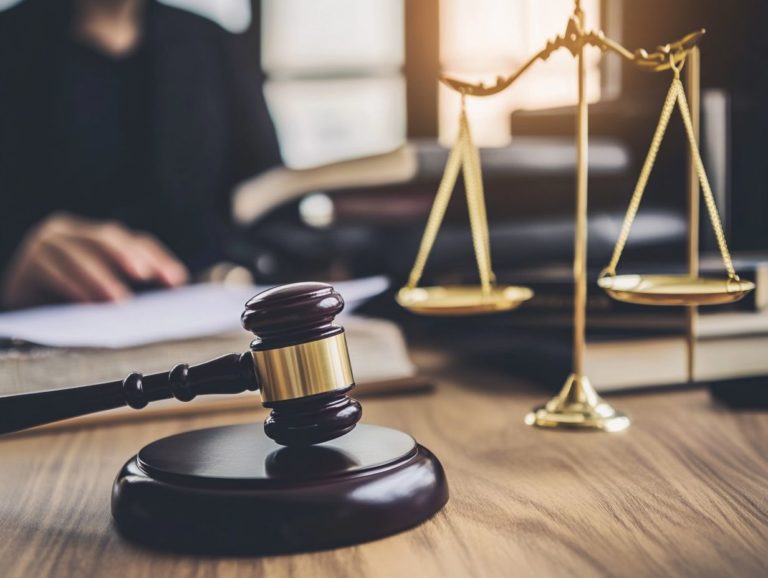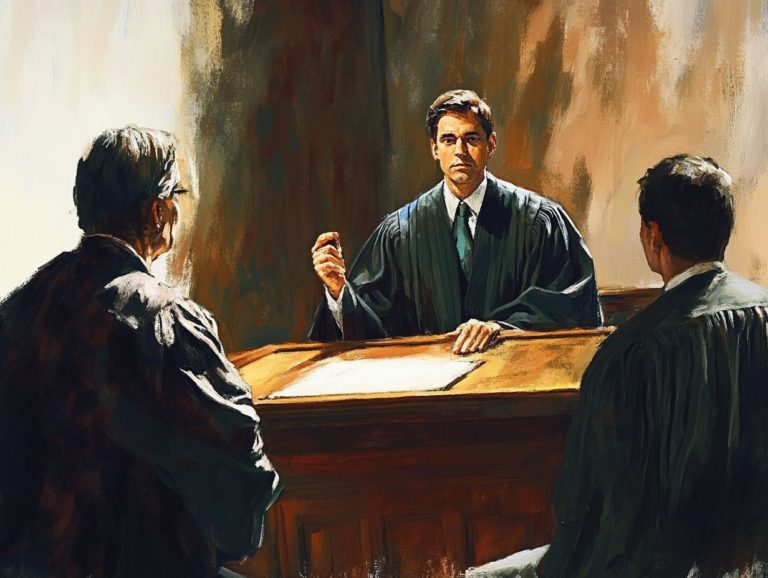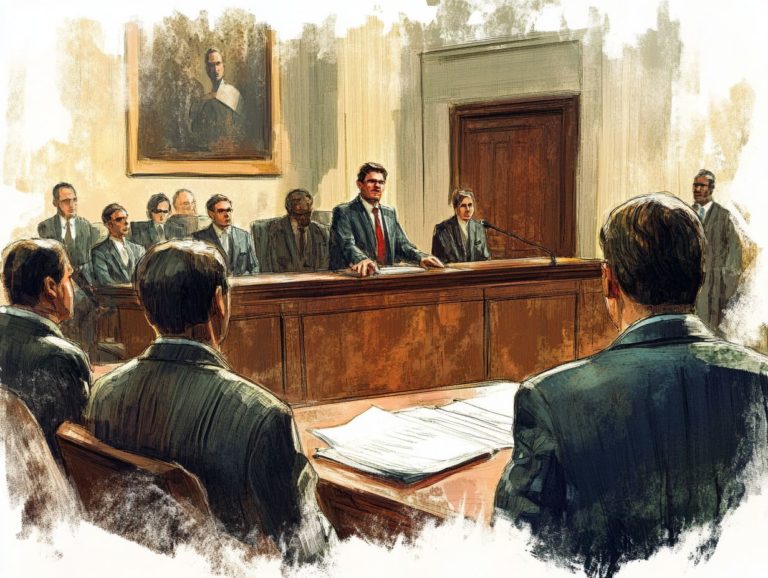Common Misconceptions About Defense Strategies
In the intricate realm of legal proceedings, understanding defense strategies is essential for anyone facing charges. If you re facing charges, knowing these strategies could change your life!
This guide will empower you to navigate the complexities of defense strategies and understand their profound influence on legal outcomes. It addresses how to select the right strategy tailored to your unique situation and highlights the crucial role a defense attorney plays in this journey.
Whether you re currently in a legal battle or simply seeking knowledge about the system, you ll find a wealth of insights to explore here.
Contents
- Key Takeaways:
- Understanding Defense Strategies
- Common Misconceptions about Defense Strategies
- The Importance of Defense Strategies
- Types of Defense Strategies
- How to Choose the Right Defense Strategy
- Working with a Defense Attorney
- Frequently Asked Questions
- What are some common misconceptions about defense strategies?
- Are defense strategies only for criminal cases?
- Do defense strategies always involve physical force?
- Are all defense strategies successful?
- What does a defense attorney do in developing a defense strategy?
- Should I hire a defense attorney for my strategy?
Key Takeaways:

Defense strategies are a crucial part of legal cases and can greatly impact the outcome. Choosing the right defense strategy involves considering factors such as the nature of the case and the evidence presented. Working with a defense attorney is essential in developing an effective defense strategy, and collaborating with them can lead to better outcomes.
Understanding Defense Strategies
Understanding defense strategies is essential for successfully maneuvering through the complexities of the criminal justice system, especially in states like North Carolina.
Here, elements such as emotional burdens, constitutional rights, and the intricacies of the legal process play a pivotal role in shaping trial outcomes and courtroom dynamics.
A well-crafted strategy can enhance the effectiveness of a defense attorney and influence the legal landscape of criminal cases while accommodating the unique personal circumstances of the accused.
What are Defense Strategies?
Defense strategies in criminal cases encompass various tactics and legal maneuvers you can employ to protect your interests, particularly during plea bargaining, which is a negotiation process where you may agree to plead guilty to a lesser charge.
These strategies cover a broad spectrum, from challenging evidence to negotiating lesser charges, all designed to secure the most favorable outcome. Understanding the importance of these strategies is vital, as they shape your defense’s argument and influence how attorneys engage with prosecutorial discretion throughout the legal process.
The effectiveness of these strategies can dramatically sway courtroom dynamics, affecting everything from jury perception to the chances of achieving a successful plea agreement. Ultimately, a well-crafted defense is key to navigating the complexities of the criminal justice system, ensuring that your rights are upheld.
Common Misconceptions about Defense Strategies
Common misconceptions about defense strategies can create significant misunderstandings about the legal process. It’s important to understand how self-representation might influence the outcomes of criminal cases.
Seeking proper legal advice is crucial for safeguarding your constitutional rights and ensuring that you’re fully informed every step of the way.
Debunking Myths and Misunderstandings
Debunking myths about defense strategies reveals the emotional stress and legal pitfalls that can arise when you re not fully informed about your rights and protections within the criminal justice system.
One prevalent misconception is that all defendants should tackle their own cases, believing they can navigate the legal complexities through research. This can lead to considerable emotional strain and severe repercussions, as the intricacies of the law often elude those lacking formal training.
Many underestimate the stakes involved and fail to recognize the myriad potential legal implications that can arise from insufficient representation. It s vital for anyone facing charges to grasp that professional legal counsel not only protects their rights but also significantly boosts their chances of achieving a favorable outcome.
The Importance of Defense Strategies

The significance of defense strategies in the criminal justice system cannot be overstated. They are vital for ensuring a fair trial, safeguarding the rights of the accused, and skillfully managing the burden of proof in legal proceedings.
Benefits and Impact on Legal Cases
The benefits of effective defense strategies can greatly influence legal cases. They shape trial outcomes and lessen the emotional burdens defendants face while navigating the judicial system.
When you work closely with a skilled defense attorney, your chances of securing a favorable verdict improve significantly. Good legal strategies not only strengthen your case but also provide reassurance, helping you manage the anxieties that accompany court proceedings.
A well-prepared defendant contributes to a fair judicial environment, paving the way for just outcomes. A strong defense can shift the responsibility to prove guilt, reducing potential penalties and creating effects that extend beyond the courtroom.
This comprehensive approach is crucial for ensuring that you feel supported throughout what can be an overwhelming process.
Types of Defense Strategies
In criminal cases, you ll encounter various defense strategies, including plea deals, procedural errors, and evidence suppression.
Each of these techniques serves a unique purpose, all aimed at protecting the rights of the accused while navigating the criminal justice system.
Exploring Different Approaches
Different approaches to defense strategies reveal critical decisions you must make as a defense attorney. These decisions are often based on reasonable suspicion and the unique circumstances of each case.
Choices may include evaluating witness credibility and assessing the strength of legal arguments. Your ability to adapt to evolving situations in criminal law is essential.
You ll often weigh the benefits of negotiation against the risks of going to trial. Understanding how to effectively use reasonable suspicion can significantly impact the outcome, highlighting the importance of a tailored approach to each client s unique situation.
How to Choose the Right Defense Strategy
Choosing the right defense strategy is essential. It requires careful consideration of several factors.
Assess the emotional burden this situation places on you, the specifics of the criminal charges, and the quality of legal representation available to guide you.
Factors to Consider

When considering your defense strategy, various factors come into play. These include your personal circumstances, constitutional rights, and the level of prosecutorial discretion in your case.
Your socio-economic status, prior criminal history, and emotional state during proceedings matter. Understanding your constitutional rights such as the right to a fair trial and protection against self-incrimination can shape your options.
The nature of the charges and the evidence presented will significantly affect your defense strategy. Each element intertwines, emphasizing the need for a tailored approach that aligns with legal precedents and your personal narrative.
Working with a Defense Attorney
Engaging a defense attorney is crucial when navigating the criminal justice system.
Effective legal counsel can shape courtroom dynamics and enhance your overall defense strategy.
The Role of a Defense Attorney
A defense attorney’s role goes beyond offering legal advice; it involves protecting your rights and easing the emotional strain of the legal process.
They act as your advocate and a source of support, helping you navigate the judicial system’s complexities. Their expertise allows them to maneuver through legal frameworks, ensuring you understand your rights and options.
Beyond the courtroom, they provide a comforting presence, recognizing that the emotional toll of criminal charges can be overwhelming. By fostering open communication, they help you make informed decisions, easing anxieties about potential outcomes and uncertainties ahead.
With diligent preparation and strategic planning, a skilled defense attorney becomes your invaluable ally in the pursuit of justice.
Collaborating on Defense Strategies
Working closely with your legal counsel on defense strategies is crucial. This partnership helps you make informed decisions that address the complexities of your criminal charges.
Open communication allows your defense attorney to tailor their approach to your specific situation. This teamwork helps identify the strengths and weaknesses of the prosecution s case.
By collaborating, you can explore different defense options and gather evidence. Together, you ll craft a strong defense that combines legal knowledge with personal insight.
Frequently Asked Questions
What are some common misconceptions about defense strategies?

Many people mistakenly think defense strategies involve only physical force or that they apply only in criminal cases. It’s also a misconception that they always succeed.
Are defense strategies only for criminal cases?
Not at all! Defense strategies can be applied in civil cases and administrative proceedings too.
Do defense strategies always involve physical force?
No, they can also include tactics like negotiation, evidence analysis, and witness testimony.
Are all defense strategies successful?
The success of a defense strategy varies and depends on factors like the strength of the case, the attorney’s skill, and the judgment of the judge or jury.
What does a defense attorney do in developing a defense strategy?
A defense attorney gathers evidence, analyzes the prosecution’s case, and creates a strategy to protect their client s rights.
Should I hire a defense attorney for my strategy?
While hiring an attorney isn’t legally required, it’s highly advisable to engage someone with the expertise needed for a successful defense strategy.
For personalized guidance, consider consulting with a defense attorney today!






